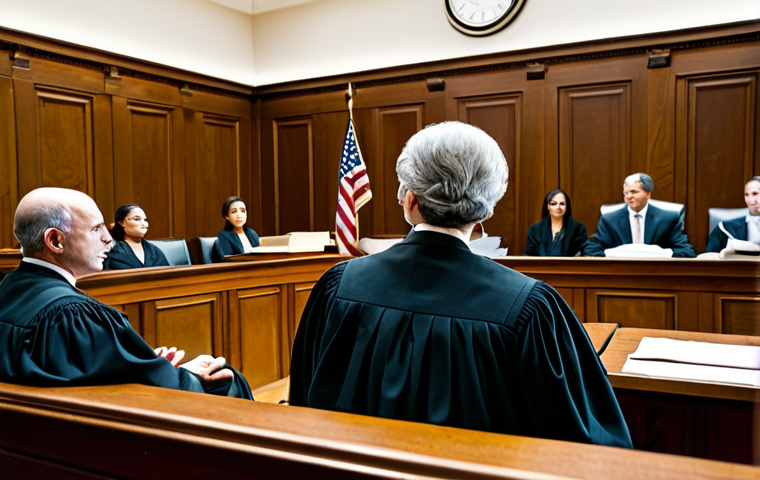Navigating the legal landscape can feel like wandering through a maze, especially when you’re trying to understand complex legal jargon and procedures.
I remember when I first started out, I felt overwhelmed by the sheer volume of information and the pressure to make the right decisions for my clients.
Over the years, I’ve learned to break down these complexities and share my knowledge in a way that’s both informative and accessible. These days, the rise of AI and its potential impact on the legal field is something I’m closely watching, particularly how it might reshape legal research and client communication.
We need to adapt. Let’s delve deeper and get the facts straight below!
Here is the blog post:
Understanding the Nuances of Legal Consultation

Legal consultation isn’t just about getting a lawyer; it’s about understanding your rights and obligations. I’ve seen countless clients walk in, completely unaware of the intricacies of their situation.
It’s crucial to approach these initial meetings with clear objectives. Are you seeking advice on a potential lawsuit? Do you need help understanding a contract?
The more prepared you are, the more effective the consultation will be.
Preparing Your Case: Documents and Information
Gathering all relevant documents beforehand can save a significant amount of time and money. I remember one client who came in with a shoebox full of papers, completely disorganized.
It took us hours to sift through everything and piece together the timeline. Having a clear, chronological record of events, along with any contracts, emails, or other relevant documents, is essential.
Asking the Right Questions
Don’t be afraid to ask questions, even if they seem basic. I encourage my clients to come prepared with a list of questions they want answered. This ensures that all their concerns are addressed and that they leave the consultation with a clear understanding of their options.
Questions about fees, potential outcomes, and the lawyer’s experience are all fair game.
Understanding Legal Fees and Costs
Legal representation can be costly, and it’s important to have a clear understanding of the fees involved. Most lawyers charge either an hourly rate or a flat fee for specific services.
Some also work on a contingency basis, meaning they only get paid if they win the case. Make sure to discuss the payment structure upfront and get everything in writing.
Decoding Legal Jargon: A Layman’s Guide
Legal documents and court proceedings are often filled with complex terminology that can be difficult to understand. Over the years, I’ve learned the importance of translating these terms into plain English for my clients.
The goal is to empower them to make informed decisions about their case.
Common Legal Terms Explained
Terms like “tort,” “negligence,” and “statute of limitations” can sound like a foreign language to someone unfamiliar with the legal system. I always take the time to explain these terms in simple, understandable language.
For example, “tort” simply means a wrongful act that causes injury to another person, while “negligence” refers to a failure to exercise reasonable care.
Resources for Legal Definitions
There are many online resources available that provide definitions of legal terms. Websites like Nolo.com and Law.com offer glossaries of legal terms that can be helpful for understanding complex jargon.
Additionally, many law libraries offer access to legal dictionaries and other resources.
Why Plain Language Matters
Using plain language in legal communication is not just about being nice; it’s about ensuring that everyone has equal access to justice. When people can understand the legal process, they are better equipped to protect their rights and advocate for themselves.
As lawyers, we have a responsibility to communicate clearly and effectively with our clients.
The Role of AI in Modern Legal Research
AI is rapidly changing the way legal research is conducted. I’ve been experimenting with AI-powered tools that can quickly analyze vast amounts of legal data, identify relevant case law, and even predict potential outcomes.
While AI is not a replacement for human judgment, it can be a valuable tool for lawyers and legal professionals.
Benefits of AI-Powered Legal Research
AI can significantly speed up the research process, allowing lawyers to focus on more strategic aspects of their cases. It can also help to identify overlooked precedents and uncover hidden patterns in legal data.
This can lead to more informed decision-making and better outcomes for clients.
Limitations and Ethical Considerations
However, it’s important to be aware of the limitations of AI. AI algorithms are only as good as the data they are trained on, and they can be biased or inaccurate.
Additionally, there are ethical concerns about the use of AI in legal decision-making. It’s crucial to ensure that AI is used responsibly and ethically, and that human judgment remains at the center of the process.
Examples of AI Tools in Legal Practice
Several AI-powered legal research tools are currently available, such as Lex Machina and Ross Intelligence. These tools use natural language processing and machine learning to analyze legal data and provide insights to lawyers.
I’ve found these tools to be particularly helpful in complex litigation cases, where there is a large volume of information to sift through.
Building Trust with Your Attorney: Communication is Key
The attorney-client relationship is built on trust and open communication. I always emphasize the importance of being honest and transparent with my clients, even when the news is not good.
It’s crucial to create a safe space where clients feel comfortable sharing their concerns and asking questions.
Establishing Clear Communication Channels
From the outset, it’s important to establish clear communication channels. This includes agreeing on how often to communicate, what methods of communication to use (e.g., email, phone calls, video conferencing), and who to contact with questions or concerns.
I always provide my clients with my direct phone number and email address, and I make myself available to answer their questions as quickly as possible.
Being Honest and Transparent
Honesty is the foundation of any successful attorney-client relationship. I always tell my clients the truth, even when it’s not what they want to hear.
This includes providing realistic assessments of their case, explaining the potential risks and benefits of different strategies, and being upfront about fees and costs.
Addressing Concerns and Misunderstandings Promptly
Misunderstandings can arise in any relationship, and it’s important to address them promptly and directly. If a client has a concern or complaint, I encourage them to bring it to my attention as soon as possible.
I take these concerns seriously and work to resolve them in a fair and professional manner.
Understanding Different Areas of Law
The legal field is vast and diverse, encompassing many different areas of law. I’ve specialized in several areas, but I also have a general understanding of other fields.
It’s important to choose a lawyer who has experience in the specific area of law that applies to your case.
Common Areas of Legal Practice
Some of the most common areas of legal practice include criminal law, family law, corporate law, real estate law, and personal injury law. Each area of law has its own unique set of rules and procedures.
For example, criminal law deals with crimes and their punishments, while family law deals with issues such as divorce, child custody, and adoption.
Choosing the Right Legal Specialization
Choosing the right legal specialization is crucial for ensuring that you have the best possible representation. If you’re facing criminal charges, you’ll want to hire a criminal defense attorney.
If you’re going through a divorce, you’ll want to hire a family law attorney. It’s important to do your research and find a lawyer who has experience in the specific area of law that applies to your case.
General Practitioners vs. Specialists
Some lawyers are general practitioners, meaning they handle a wide variety of cases. Others are specialists, meaning they focus on a specific area of law.
Both types of lawyers can be effective, but specialists often have a deeper understanding of the specific rules and procedures that apply to their area of law.
How to Prepare for Your First Meeting with a Lawyer
Preparing for your first meeting with a lawyer can significantly impact the outcome of your case. It ensures you make the most of your time and that the lawyer can provide accurate and relevant advice.
Here’s a detailed guide to help you get ready:
Gathering Essential Documents
The key to an effective consultation is having all your documents in order. These documents help the lawyer understand the specifics of your situation quickly and accurately.
Here’s what you should collect:
Contracts
Any agreements or contracts relevant to your case, such as lease agreements, employment contracts, or sales agreements.
Correspondence
Keep copies of all letters, emails, and text messages related to your case. These can provide important context and evidence.
Financial Records
Bank statements, tax returns, and any other financial records that are relevant, especially in cases involving financial disputes or business matters.
Writing a Detailed Summary of Events
Prepare a written summary outlining the key events leading up to your need for legal advice. Include dates, names, and locations.
Chronological Order
Organize your summary in chronological order to provide a clear timeline of events.
Key Details
Focus on the most important details that are directly related to your legal issue.
Clarity and Conciseness
Write in clear and concise language to help the lawyer quickly grasp the situation.
Preparing a List of Questions
Creating a list of questions ensures that all your concerns are addressed during the consultation. Write down everything you want to know to maximize the value of your meeting.
Legal Options
Ask about the different legal options available to you based on your circumstances.
Potential Outcomes
Inquire about the possible outcomes of your case and the likelihood of success.
Fees and Costs
Get a clear understanding of the lawyer’s fees, payment options, and any additional costs you might incur.
Understanding Legal Representation Costs: Fees and Payment Options
One of the first questions many people have when seeking legal help is, “How much will this cost?” Understanding the different types of legal fees and payment options can help you budget and avoid surprises.
Here’s a breakdown of what you need to know:
| Fee Type | Description | Example |
|---|---|---|
| Hourly Rate | The lawyer charges a set amount for each hour of work. | $300 per hour for a complex litigation case. |
| Flat Fee | A fixed fee for a specific legal service, regardless of the time spent. | $1,500 for drafting a simple will. |
| Contingency Fee | The lawyer only gets paid if you win the case; the fee is a percentage of the recovery. | 33% of the settlement in a personal injury case. |
| Retainer Fee | An upfront payment to secure the lawyer’s services, often used to cover initial costs. | $5,000 retainer for ongoing legal advice. |
Additional Costs to Consider
Beyond the lawyer’s fees, there are other costs you might encounter. Be sure to ask your lawyer about these potential expenses upfront.
Court Fees
Filing fees, motion fees, and other costs associated with court proceedings.
Expert Witness Fees
Fees for expert witnesses who provide specialized knowledge or testimony.
Travel Expenses
Costs for the lawyer or their staff to travel for court appearances, depositions, or other case-related activities.
Navigating the Court
The court system can be intimidating, but understanding the basic process can make it less daunting. From filing a lawsuit to attending hearings, here’s what you need to know to navigate the legal system effectively.
Filing a Lawsuit
The first step in many legal cases is filing a lawsuit. This involves preparing the necessary documents and submitting them to the court. The lawsuit should clearly state the facts of the case, the legal claims, and the relief you are seeking.
Discovery Process
After the lawsuit is filed, the discovery process begins. This is the stage where both sides gather information and evidence related to the case. Common discovery methods include:
Interrogatories
Written questions that must be answered under oath.
Depositions
Oral examinations of witnesses under oath.
Document Requests
Requests for the other side to produce relevant documents.
Understanding the Nuances of Legal Consultation
Legal consultation isn’t just about getting a lawyer; it’s about understanding your rights and obligations. I’ve seen countless clients walk in, completely unaware of the intricacies of their situation. It’s crucial to approach these initial meetings with clear objectives. Are you seeking advice on a potential lawsuit? Do you need help understanding a contract? The more prepared you are, the more effective the consultation will be.
Preparing Your Case: Documents and Information
Gathering all relevant documents beforehand can save a significant amount of time and money. I remember one client who came in with a shoebox full of papers, completely disorganized. It took us hours to sift through everything and piece together the timeline. Having a clear, chronological record of events, along with any contracts, emails, or other relevant documents, is essential.
Asking the Right Questions
Don’t be afraid to ask questions, even if they seem basic. I encourage my clients to come prepared with a list of questions they want answered. This ensures that all their concerns are addressed and that they leave the consultation with a clear understanding of their options. Questions about fees, potential outcomes, and the lawyer’s experience are all fair game.
Understanding Legal Fees and Costs
Legal representation can be costly, and it’s important to have a clear understanding of the fees involved. Most lawyers charge either an hourly rate or a flat fee for specific services. Some also work on a contingency basis, meaning they only get paid if they win the case. Make sure to discuss the payment structure upfront and get everything in writing.
Decoding Legal Jargon: A Layman’s Guide
Legal documents and court proceedings are often filled with complex terminology that can be difficult to understand. Over the years, I’ve learned the importance of translating these terms into plain English for my clients. The goal is to empower them to make informed decisions about their case.
Common Legal Terms Explained
Terms like “tort,” “negligence,” and “statute of limitations” can sound like a foreign language to someone unfamiliar with the legal system. I always take the time to explain these terms in simple, understandable language. For example, “tort” simply means a wrongful act that causes injury to another person, while “negligence” refers to a failure to exercise reasonable care.
Resources for Legal Definitions
There are many online resources available that provide definitions of legal terms. Websites like Nolo.com and Law.com offer glossaries of legal terms that can be helpful for understanding complex jargon. Additionally, many law libraries offer access to legal dictionaries and other resources.
Why Plain Language Matters
Using plain language in legal communication is not just about being nice; it’s about ensuring that everyone has equal access to justice. When people can understand the legal process, they are better equipped to protect their rights and advocate for themselves. As lawyers, we have a responsibility to communicate clearly and effectively with our clients.
The Role of AI in Modern Legal Research
AI is rapidly changing the way legal research is conducted. I’ve been experimenting with AI-powered tools that can quickly analyze vast amounts of legal data, identify relevant case law, and even predict potential outcomes. While AI is not a replacement for human judgment, it can be a valuable tool for lawyers and legal professionals.
Benefits of AI-Powered Legal Research
AI can significantly speed up the research process, allowing lawyers to focus on more strategic aspects of their cases. It can also help to identify overlooked precedents and uncover hidden patterns in legal data. This can lead to more informed decision-making and better outcomes for clients.
Limitations and Ethical Considerations
However, it’s important to be aware of the limitations of AI. AI algorithms are only as good as the data they are trained on, and they can be biased or inaccurate. Additionally, there are ethical concerns about the use of AI in legal decision-making. It’s crucial to ensure that AI is used responsibly and ethically, and that human judgment remains at the center of the process.
Examples of AI Tools in Legal Practice
Several AI-powered legal research tools are currently available, such as Lex Machina and Ross Intelligence. These tools use natural language processing and machine learning to analyze legal data and provide insights to lawyers. I’ve found these tools to be particularly helpful in complex litigation cases, where there is a large volume of information to sift through.
Building Trust with Your Attorney: Communication is Key
The attorney-client relationship is built on trust and open communication. I always emphasize the importance of being honest and transparent with my clients, even when the news is not good. It’s crucial to create a safe space where clients feel comfortable sharing their concerns and asking questions.
Establishing Clear Communication Channels
From the outset, it’s important to establish clear communication channels. This includes agreeing on how often to communicate, what methods of communication to use (e.g., email, phone calls, video conferencing), and who to contact with questions or concerns. I always provide my clients with my direct phone number and email address, and I make myself available to answer their questions as quickly as possible.
Being Honest and Transparent
Honesty is the foundation of any successful attorney-client relationship. I always tell my clients the truth, even when it’s not what they want to hear. This includes providing realistic assessments of their case, explaining the potential risks and benefits of different strategies, and being upfront about fees and costs.
Addressing Concerns and Misunderstandings Promptly
Misunderstandings can arise in any relationship, and it’s important to address them promptly and directly. If a client has a concern or complaint, I encourage them to bring it to my attention as soon as possible. I take these concerns seriously and work to resolve them in a fair and professional manner.
Understanding Different Areas of Law
The legal field is vast and diverse, encompassing many different areas of law. I’ve specialized in several areas, but I also have a general understanding of other fields. It’s important to choose a lawyer who has experience in the specific area of law that applies to your case.
Common Areas of Legal Practice
Some of the most common areas of legal practice include criminal law, family law, corporate law, real estate law, and personal injury law. Each area of law has its own unique set of rules and procedures. For example, criminal law deals with crimes and their punishments, while family law deals with issues such as divorce, child custody, and adoption.
Choosing the Right Legal Specialization
Choosing the right legal specialization is crucial for ensuring that you have the best possible representation. If you’re facing criminal charges, you’ll want to hire a criminal defense attorney. If you’re going through a divorce, you’ll want to hire a family law attorney. It’s important to do your research and find a lawyer who has experience in the specific area of law that applies to your case.
General Practitioners vs. Specialists
Some lawyers are general practitioners, meaning they handle a wide variety of cases. Others are specialists, meaning they focus on a specific area of law. Both types of lawyers can be effective, but specialists often have a deeper understanding of the specific rules and procedures that apply to their area of law.
How to Prepare for Your First Meeting with a Lawyer
Preparing for your first meeting with a lawyer can significantly impact the outcome of your case. It ensures you make the most of your time and that the lawyer can provide accurate and relevant advice. Here’s a detailed guide to help you get ready:
Gathering Essential Documents
The key to an effective consultation is having all your documents in order. These documents help the lawyer understand the specifics of your situation quickly and accurately. Here’s what you should collect:
Contracts
Any agreements or contracts relevant to your case, such as lease agreements, employment contracts, or sales agreements.
Correspondence
Keep copies of all letters, emails, and text messages related to your case. These can provide important context and evidence.
Financial Records
Bank statements, tax returns, and any other financial records that are relevant, especially in cases involving financial disputes or business matters.
Writing a Detailed Summary of Events
Prepare a written summary outlining the key events leading up to your need for legal advice. Include dates, names, and locations.
Chronological Order
Organize your summary in chronological order to provide a clear timeline of events.
Key Details
Focus on the most important details that are directly related to your legal issue.
Clarity and Conciseness
Write in clear and concise language to help the lawyer quickly grasp the situation.
Preparing a List of Questions
Creating a list of questions ensures that all your concerns are addressed during the consultation. Write down everything you want to know to maximize the value of your meeting.
Legal Options
Ask about the different legal options available to you based on your circumstances.
Potential Outcomes
Inquire about the possible outcomes of your case and the likelihood of success.
Fees and Costs
Get a clear understanding of the lawyer’s fees, payment options, and any additional costs you might incur.
Understanding Legal Representation Costs: Fees and Payment Options
One of the first questions many people have when seeking legal help is, “How much will this cost?” Understanding the different types of legal fees and payment options can help you budget and avoid surprises. Here’s a breakdown of what you need to know:
| Fee Type | Description | Example |
|---|---|---|
| Hourly Rate | The lawyer charges a set amount for each hour of work. | $300 per hour for a complex litigation case. |
| Flat Fee | A fixed fee for a specific legal service, regardless of the time spent. | $1,500 for drafting a simple will. |
| Contingency Fee | The lawyer only gets paid if you win the case; the fee is a percentage of the recovery. | 33% of the settlement in a personal injury case. |
| Retainer Fee | An upfront payment to secure the lawyer’s services, often used to cover initial costs. | $5,000 retainer for ongoing legal advice. |
Additional Costs to Consider
Beyond the lawyer’s fees, there are other costs you might encounter. Be sure to ask your lawyer about these potential expenses upfront.
Court Fees
Filing fees, motion fees, and other costs associated with court proceedings.
Expert Witness Fees
Fees for expert witnesses who provide specialized knowledge or testimony.
Travel Expenses
Costs for the lawyer or their staff to travel for court appearances, depositions, or other case-related activities.
Navigating the Court System
The court system can be intimidating, but understanding the basic process can make it less daunting. From filing a lawsuit to attending hearings, here’s what you need to know to navigate the legal system effectively.
Filing a Lawsuit
The first step in many legal cases is filing a lawsuit. This involves preparing the necessary documents and submitting them to the court. The lawsuit should clearly state the facts of the case, the legal claims, and the relief you are seeking.
Discovery Process
After the lawsuit is filed, the discovery process begins. This is the stage where both sides gather information and evidence related to the case. Common discovery methods include:
Interrogatories
Written questions that must be answered under oath.
Depositions
Oral examinations of witnesses under oath.
Document Requests
Requests for the other side to produce relevant documents.
In Conclusion
Navigating the legal landscape can feel overwhelming, but with the right preparation and knowledge, you can confidently approach legal consultations and proceedings. Remember to gather your documents, ask pertinent questions, and maintain open communication with your attorney. Your proactive involvement is key to a successful legal journey.
Useful Information
1. Check the lawyer’s credentials and reviews on sites like Avvo and Martindale-Hubbell.
2. Always get fee agreements in writing to avoid any confusion later.
3. Prepare a detailed timeline of events related to your case.
4. Understand the Statute of Limitations for your specific legal issue to avoid missing deadlines.
5. Explore free or low-cost legal aid services in your community if you have limited financial resources.
Key Takeaways
– Proper preparation for legal consultations can save time and money.
– Understanding legal terminology is crucial for informed decision-making.
– Open communication and trust are essential in the attorney-client relationship.
Frequently Asked Questions (FAQ) 📖
Q: How can
A: I tools be used effectively for legal research without compromising accuracy and thoroughness? A1: From my experience, the key is to use AI tools as a starting point, not the finish line.
Think of them as super-powered assistants that can quickly sift through vast amounts of case law and statutes. However, you absolutely must verify the AI’s findings with your own independent research and critical analysis.
Double-check citations, understand the context of each case, and consider potential biases in the AI’s algorithms. I’ve seen cases where relying solely on AI-generated summaries led to overlooking crucial dissenting opinions or subsequent appeals that significantly altered the legal landscape.
It’s about augmenting your expertise, not replacing it.
Q: What are the ethical considerations lawyers should keep in mind when using
A: I for client communication? A2: Transparency and maintaining client confidentiality are paramount. Imagine a scenario where an AI chatbot is drafting emails to clients – it’s crucial to ensure the client knows they’re interacting with AI, not a human.
Furthermore, you need robust security measures to prevent data breaches and unauthorized access to sensitive client information. I once consulted on a case where a firm’s poorly secured AI system accidentally leaked confidential information during a client interaction.
It was a PR nightmare and resulted in serious legal repercussions. It all comes down to prioritizing ethical principles above the efficiency AI offers.
Q: How can law firms prepare their workforce for the increasing integration of
A: I into legal practice? A3: The best approach is to invest in comprehensive training programs that focus on both the technical aspects of AI and its practical application in legal work.
It’s not just about learning how to use the tools, but also about understanding their limitations and potential pitfalls. We ran a series of workshops at my firm focusing on topics like prompt engineering, AI ethics, and data security.
By equipping your team with the necessary skills and knowledge, you empower them to use AI effectively and responsibly. Plus, addressing concerns about job security is vital, emphasizing that AI will enhance their roles, not replace them, will boost morale and foster a culture of innovation.
📚 References
Wikipedia Encyclopedia
구글 검색 결과
구글 검색 결과
구글 검색 결과
구글 검색 결과
구글 검색 결과






